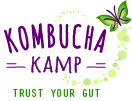
On today’s episode of Mamma Mondays, we’re talking about the Kombucha microbiology with Keisha-Rose Harrison who is a PhD candidate at Oregon State University in fermentation science. Her research is dedicated to furthering the scientific knowledge behind the Kombucha SCOBY and its microbial biome.
She is majored in microbiology at Oklahoma State University because of her passion for home brewing. In her new laboratory, she combines two of her passions, Kombucha and Molecular Biology. The aim is to determine the amount of microbial diversity present in SCOBYs before establishing a categorical system. In her current research, Keisha is collecting samples from across North America to identify the bacteria and yeast that thrive in commercial breweries.
Kombucha is a potential source of probiotics. It is naturally fermented and all of the probiotic bacteria present are active and digestible. Kombucha bacteria includes lactic-acid bacteria, which can work as a probiotic. We must first get a better understanding of it so in this video, we will fully understand the Kombucha microbiology.
TIMESTAMP
- 1:00 Check out our gift page for the Kombucha lover in your life!
- 2:10 What is KBI?
- 4:29 Keisha Rose’s official university page!
- 5:16 Check out our shop for DNA sequencing, commercial consulting, and more!
- 4:49 How can Kombucha help our DNA?
- 14:02 Can Kombucha alleviate my symptoms?
- 15:37 Science nerds, check out KBI’s Kombucha research database!
- 18:00 The Kombucha SCOBY: explained!
- 20:00 Are you interested in Kombucha research or producing Kombucha on a commercial scale? Check out KBI!
- 24:08 Get your scientific Kombucha testing tools here!
- 24:55 Find out more about Kombucha and alcohol here!
- 27:33 Hard Kombucha? Check out more info here!
- 39:34 What do I do with my extra SCOBYs to prevent under-oxygenation?
- 41:40 How to trim your SCOBY:
- 47:08 What are the different acids in Kombucha?
- 57:00 Contact Kombucha Kamp
#Microbiology #probiotics #bacteria #yeast #Kombuchamicrobes #Kombuchamicrobiology
